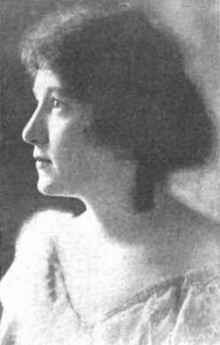Betty Brice
Rosetta Dewart Brice (August 4, 1888 – February 15, 1935) also billed as Betty Brice, was an American actress in many silent films.
Betty Brice | |
|---|---|
 Brice in a 1915 publication. | |
| Born | Rosetta Dewart Brice August 4, 1888 Sunbury, Pennsylvania, U.S. |
| Died | February 15, 1935 (aged 46) Van Nuys, California, U.S. |
| Other names | Rosetta Brice |
| Occupation | actress |
| Known for | silent films |
Early life
Rosetta Dewart Brice was born in Sunbury, Pennsylvania,[1] the daughter of Edward Lincoln Brice and Bessie S. Dewart Brice. Her maternal grandfather was William Lewis Dewart, a congressman from Pennsylvania.[2] Her grandmother and great-grandmother were both also named "Rosetta".[3] She was raised in Washington, D.C.[4]
_-_1.jpg)
Career
After some time on the stage with stock companies, Brice began acting in silent films, under contract to the Lubin studio in Philadelphia. "I daresay I never will fail to feel that little thrill that comes when I see myself on the screen," she told an interviewer in 1915.[4]
Films featuring Brice, many of them short films and serials that highlighted Brice's athleticism in stunts, riding, and swimming scenes, included The Price of Victory (1913), A Servant of the Rich (1914), The House of Fear (1914), A Cruel Revenge (1914), The Puritan (1914), The Mansion of Sobs (1914), Officer Jim (1914), In the Northland (1914), The Greater Treasure (1914), The Incompetent (1914), The Wolf (1914), Michael Strogoff (1914),[5][6] The Fortune Hunter (1914),[7] The Erring (1914), The Only Way Out (1915), The Blessed Miracle (1915), The Road o' Strife (1915),[8] The College Widow (1915), In the Dark (1915), The Sporting Duchess (1915),[9] Her Answer (1915), The District Attorney (1915), Whom the Gods Would Destroy (1915), The Call of Motherhood (1915), The Climbers (1915), Polly of the Pots and Pans (1915), The Phantom Happiness (1915),[10] The Last Rose (1915), When Youth is Ambitious (1915), The Rights of Man: A Story of War's Red Blotch (1915),[11] The Meddlesome Darling (1915), A Man's Making (1915),[12] Sweeter than Revenge (1915), The Evangelist (1916), The Gods of Fate (1916),[12] Her Bleeding Heart (1916), Love's Toll (1916),[13] Who Knows? (1917), Loyalty (1917),[14] Humility (1918),[15] The Third Generation (1920), The Sagebrusher (1920), The Money Changers (1920), A Beggar in Purple (1920), The Spenders (1921), The Green Temptation (1922), Heart's Haven (1922), Beau Brummel (1924).[16]
Personal life
Brice was engaged to Horace Carpentier Hurlbutt in 1908,[17] but when he objected to her acting career she broke the engagement. She soon married editor John Oliver La Gorce instead; they had a son, Gilbert Grosvenor La Gorce, before they divorced in 1913.[18] She married director and actor Jack Pratt as her second husband. She died in 1935, aged 46 years, from heart disease, in Van Nuys, California.[4][19]
References
- "Rosetta Brice -- Lubin Leading Lady". Motography. 13: 360. March 6, 1915.
- "A Large and Brilliant Wedding". Public Press. February 12, 1897. p. 3. Retrieved August 4, 2019 – via Newspapers.com.
- "Estimable Lady". The Sunbury American. May 23, 1902. p. 3. Retrieved August 4, 2019 – via Newspapers.com.
- "Rosetta Brice". Betzwood Film Archive. 2013-03-10. Retrieved 2019-08-04.
- Mavis, Paul (2015-06-08). The Espionage Filmography: United States Releases, 1898 through 1999. McFarland. p. 204. ISBN 9781476604275.
- Taves, Brian (2015-04-22). Hollywood Presents Jules Verne: The Father of Science Fiction on Screen. University Press of Kentucky. ISBN 9780813161136.
- Kelly, Kitty (September 18, 1914). "Photoplay Stories and News". Chicago Tribune. p. 8. Retrieved August 4, 2019 – via Newspapers.com.
- Rainey, Buck (2015-06-08). Serials and Series: A World Filmography, 1912-1956. McFarland. p. 204. ISBN 9781476604480.
- "Lubin's 'The Sporting Duchess'". Motography. 13: 1009. June 19, 1915.
- "'The Phantom Happiness' (Lubin)". The Moving Picture World. 25: 1501. August 28, 1915.
- "Richard Buhler in 'A Man's Making'". The Baltimore Sun. January 2, 1916. p. 35. Retrieved August 4, 2019 – via Newspapers.com.
- "'The Gods of Fate' an Epic of Labor". Motography. 15: 61. January 8, 1916.
- "V. L. S. E. Announces Attractive Features". Motography. 15: 1093. May 13, 1916.
- Langman, Larry (1998). American Film Cycles: The Silent Era. Greenwood Publishing Group. ISBN 9780313306570.
- Katchmer, George A. (2009-09-22). A Biographical Dictionary of Silent Film Western Actors and Actresses. McFarland. p. 269. ISBN 9780786446933.
- Munden, Kenneth White; Institute, American Film (1997). The American Film Institute Catalog of Motion Pictures Produced in the United States. University of California Press. pp. 44, 316, 334, 755. ISBN 9780520209695.
- "Untitled society item". The Washington Herald. February 29, 1908. p. 5. Retrieved August 4, 2019 – via Newspapers.com.
- "Was Ordered Out of House". Reno Gazette-Journal. January 3, 1913. p. 2. Retrieved August 4, 2019 – via Newspapers.com.
- Wilson, Scott (2016-08-19). Resting Places: The Burial Sites of More Than 14,000 Famous Persons, 3d ed. McFarland. p. 87. ISBN 9781476625997.